Spiritual Assessment Report: Interview Analysis and Assessment Tool
VerifiedAdded on 2023/06/03
|7
|1690
|499
Report
AI Summary
This report details a spiritual assessment conducted through an interview with a 68-year-old Buddhist male with chronic illnesses, including Type II Diabetes, Hypertension, and depression. The report is divided into two parts: the interview transcript and a thorough analysis of the participant's responses. The analysis examines cultural competence, spiritual salience, and spiritual needs, considering the impact of the client's faith on his life and coping mechanisms. The assessment highlights the client's reliance on faith and his negative experiences with therapy. Based on the analysis, the report proposes a spiritual assessment tool, including questions designed to understand the client's sources of strength, beliefs about God, the impact of illness on family, perceptions of death, and the role of faith in coping. The report aims to provide insights into the client's spiritual needs, incorporating the client's religious sentiments while devising a therapy and ensuring culturally safe care aligned with the religious background of the client.
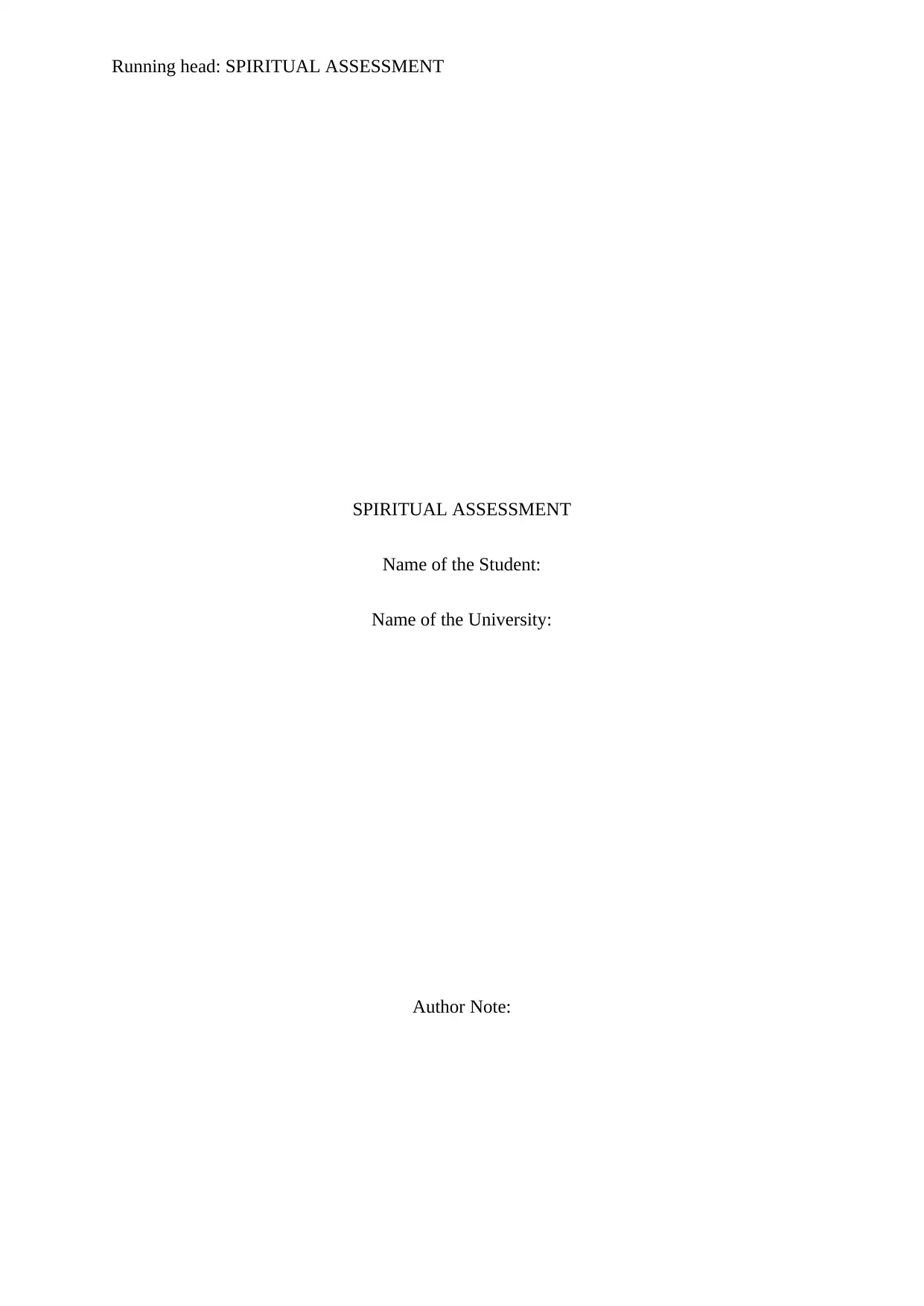
Running head: SPIRITUAL ASSESSMENT
SPIRITUAL ASSESSMENT
Name of the Student:
Name of the University:
Author Note:
SPIRITUAL ASSESSMENT
Name of the Student:
Name of the University:
Author Note:
Paraphrase This Document
Need a fresh take? Get an instant paraphrase of this document with our AI Paraphraser
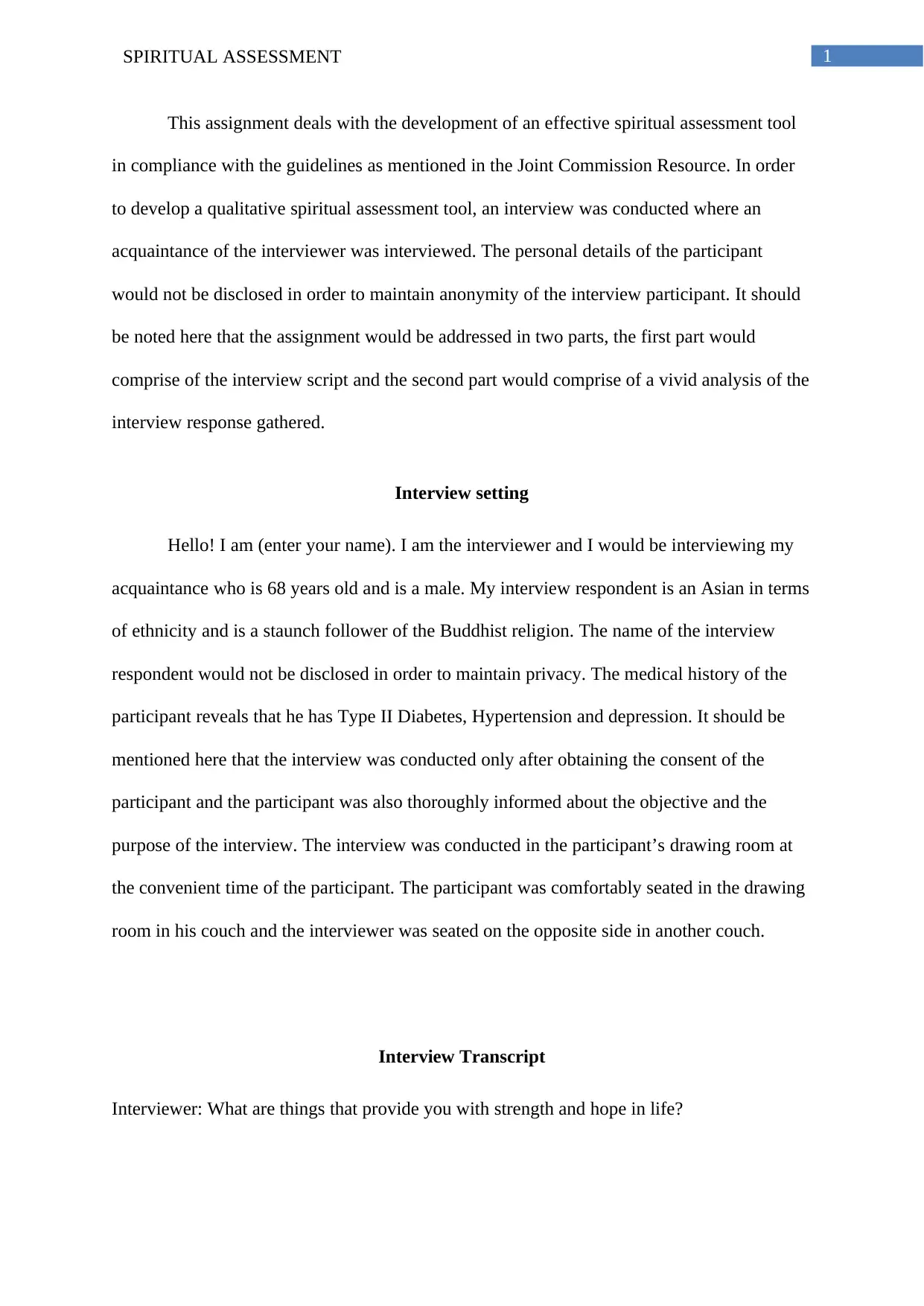
1SPIRITUAL ASSESSMENT
This assignment deals with the development of an effective spiritual assessment tool
in compliance with the guidelines as mentioned in the Joint Commission Resource. In order
to develop a qualitative spiritual assessment tool, an interview was conducted where an
acquaintance of the interviewer was interviewed. The personal details of the participant
would not be disclosed in order to maintain anonymity of the interview participant. It should
be noted here that the assignment would be addressed in two parts, the first part would
comprise of the interview script and the second part would comprise of a vivid analysis of the
interview response gathered.
Interview setting
Hello! I am (enter your name). I am the interviewer and I would be interviewing my
acquaintance who is 68 years old and is a male. My interview respondent is an Asian in terms
of ethnicity and is a staunch follower of the Buddhist religion. The name of the interview
respondent would not be disclosed in order to maintain privacy. The medical history of the
participant reveals that he has Type II Diabetes, Hypertension and depression. It should be
mentioned here that the interview was conducted only after obtaining the consent of the
participant and the participant was also thoroughly informed about the objective and the
purpose of the interview. The interview was conducted in the participant’s drawing room at
the convenient time of the participant. The participant was comfortably seated in the drawing
room in his couch and the interviewer was seated on the opposite side in another couch.
Interview Transcript
Interviewer: What are things that provide you with strength and hope in life?
This assignment deals with the development of an effective spiritual assessment tool
in compliance with the guidelines as mentioned in the Joint Commission Resource. In order
to develop a qualitative spiritual assessment tool, an interview was conducted where an
acquaintance of the interviewer was interviewed. The personal details of the participant
would not be disclosed in order to maintain anonymity of the interview participant. It should
be noted here that the assignment would be addressed in two parts, the first part would
comprise of the interview script and the second part would comprise of a vivid analysis of the
interview response gathered.
Interview setting
Hello! I am (enter your name). I am the interviewer and I would be interviewing my
acquaintance who is 68 years old and is a male. My interview respondent is an Asian in terms
of ethnicity and is a staunch follower of the Buddhist religion. The name of the interview
respondent would not be disclosed in order to maintain privacy. The medical history of the
participant reveals that he has Type II Diabetes, Hypertension and depression. It should be
mentioned here that the interview was conducted only after obtaining the consent of the
participant and the participant was also thoroughly informed about the objective and the
purpose of the interview. The interview was conducted in the participant’s drawing room at
the convenient time of the participant. The participant was comfortably seated in the drawing
room in his couch and the interviewer was seated on the opposite side in another couch.
Interview Transcript
Interviewer: What are things that provide you with strength and hope in life?
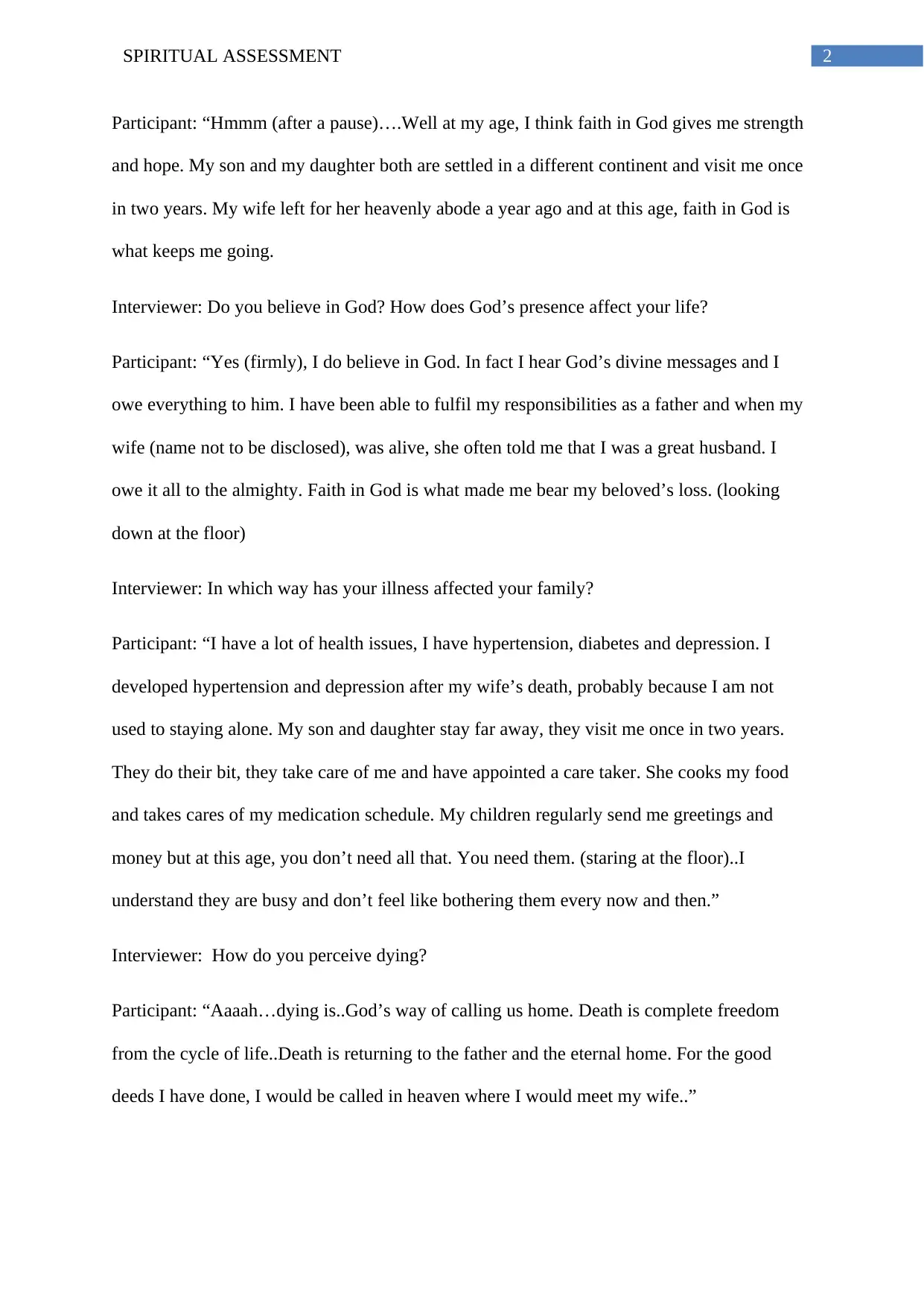
2SPIRITUAL ASSESSMENT
Participant: “Hmmm (after a pause)….Well at my age, I think faith in God gives me strength
and hope. My son and my daughter both are settled in a different continent and visit me once
in two years. My wife left for her heavenly abode a year ago and at this age, faith in God is
what keeps me going.
Interviewer: Do you believe in God? How does God’s presence affect your life?
Participant: “Yes (firmly), I do believe in God. In fact I hear God’s divine messages and I
owe everything to him. I have been able to fulfil my responsibilities as a father and when my
wife (name not to be disclosed), was alive, she often told me that I was a great husband. I
owe it all to the almighty. Faith in God is what made me bear my beloved’s loss. (looking
down at the floor)
Interviewer: In which way has your illness affected your family?
Participant: “I have a lot of health issues, I have hypertension, diabetes and depression. I
developed hypertension and depression after my wife’s death, probably because I am not
used to staying alone. My son and daughter stay far away, they visit me once in two years.
They do their bit, they take care of me and have appointed a care taker. She cooks my food
and takes cares of my medication schedule. My children regularly send me greetings and
money but at this age, you don’t need all that. You need them. (staring at the floor)..I
understand they are busy and don’t feel like bothering them every now and then.”
Interviewer: How do you perceive dying?
Participant: “Aaaah…dying is..God’s way of calling us home. Death is complete freedom
from the cycle of life..Death is returning to the father and the eternal home. For the good
deeds I have done, I would be called in heaven where I would meet my wife..”
Participant: “Hmmm (after a pause)….Well at my age, I think faith in God gives me strength
and hope. My son and my daughter both are settled in a different continent and visit me once
in two years. My wife left for her heavenly abode a year ago and at this age, faith in God is
what keeps me going.
Interviewer: Do you believe in God? How does God’s presence affect your life?
Participant: “Yes (firmly), I do believe in God. In fact I hear God’s divine messages and I
owe everything to him. I have been able to fulfil my responsibilities as a father and when my
wife (name not to be disclosed), was alive, she often told me that I was a great husband. I
owe it all to the almighty. Faith in God is what made me bear my beloved’s loss. (looking
down at the floor)
Interviewer: In which way has your illness affected your family?
Participant: “I have a lot of health issues, I have hypertension, diabetes and depression. I
developed hypertension and depression after my wife’s death, probably because I am not
used to staying alone. My son and daughter stay far away, they visit me once in two years.
They do their bit, they take care of me and have appointed a care taker. She cooks my food
and takes cares of my medication schedule. My children regularly send me greetings and
money but at this age, you don’t need all that. You need them. (staring at the floor)..I
understand they are busy and don’t feel like bothering them every now and then.”
Interviewer: How do you perceive dying?
Participant: “Aaaah…dying is..God’s way of calling us home. Death is complete freedom
from the cycle of life..Death is returning to the father and the eternal home. For the good
deeds I have done, I would be called in heaven where I would meet my wife..”
⊘ This is a preview!⊘
Do you want full access?
Subscribe today to unlock all pages.

Trusted by 1+ million students worldwide
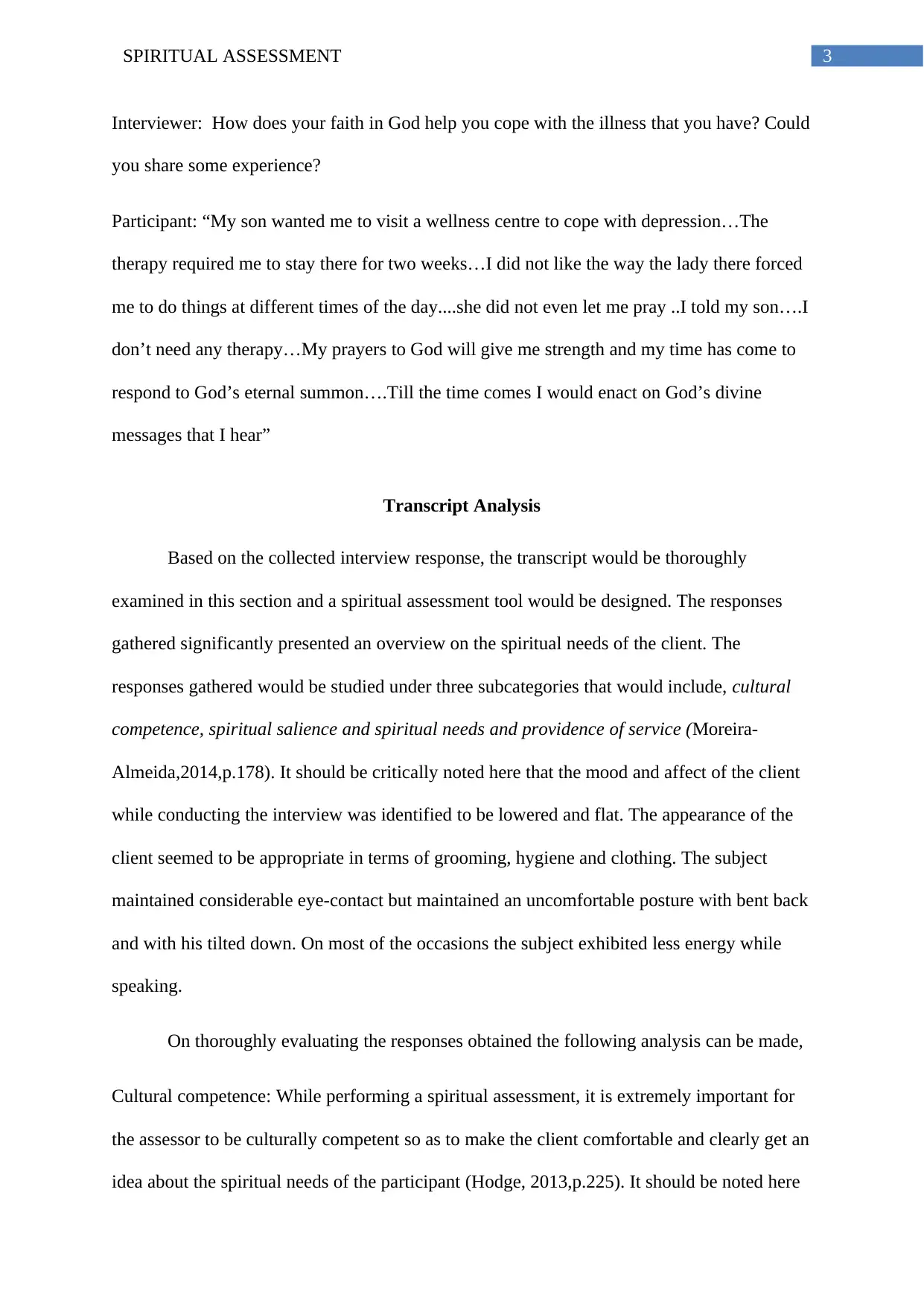
3SPIRITUAL ASSESSMENT
Interviewer: How does your faith in God help you cope with the illness that you have? Could
you share some experience?
Participant: “My son wanted me to visit a wellness centre to cope with depression…The
therapy required me to stay there for two weeks…I did not like the way the lady there forced
me to do things at different times of the day....she did not even let me pray ..I told my son….I
don’t need any therapy…My prayers to God will give me strength and my time has come to
respond to God’s eternal summon….Till the time comes I would enact on God’s divine
messages that I hear”
Transcript Analysis
Based on the collected interview response, the transcript would be thoroughly
examined in this section and a spiritual assessment tool would be designed. The responses
gathered significantly presented an overview on the spiritual needs of the client. The
responses gathered would be studied under three subcategories that would include, cultural
competence, spiritual salience and spiritual needs and providence of service (Moreira-
Almeida,2014,p.178). It should be critically noted here that the mood and affect of the client
while conducting the interview was identified to be lowered and flat. The appearance of the
client seemed to be appropriate in terms of grooming, hygiene and clothing. The subject
maintained considerable eye-contact but maintained an uncomfortable posture with bent back
and with his tilted down. On most of the occasions the subject exhibited less energy while
speaking.
On thoroughly evaluating the responses obtained the following analysis can be made,
Cultural competence: While performing a spiritual assessment, it is extremely important for
the assessor to be culturally competent so as to make the client comfortable and clearly get an
idea about the spiritual needs of the participant (Hodge, 2013,p.225). It should be noted here
Interviewer: How does your faith in God help you cope with the illness that you have? Could
you share some experience?
Participant: “My son wanted me to visit a wellness centre to cope with depression…The
therapy required me to stay there for two weeks…I did not like the way the lady there forced
me to do things at different times of the day....she did not even let me pray ..I told my son….I
don’t need any therapy…My prayers to God will give me strength and my time has come to
respond to God’s eternal summon….Till the time comes I would enact on God’s divine
messages that I hear”
Transcript Analysis
Based on the collected interview response, the transcript would be thoroughly
examined in this section and a spiritual assessment tool would be designed. The responses
gathered significantly presented an overview on the spiritual needs of the client. The
responses gathered would be studied under three subcategories that would include, cultural
competence, spiritual salience and spiritual needs and providence of service (Moreira-
Almeida,2014,p.178). It should be critically noted here that the mood and affect of the client
while conducting the interview was identified to be lowered and flat. The appearance of the
client seemed to be appropriate in terms of grooming, hygiene and clothing. The subject
maintained considerable eye-contact but maintained an uncomfortable posture with bent back
and with his tilted down. On most of the occasions the subject exhibited less energy while
speaking.
On thoroughly evaluating the responses obtained the following analysis can be made,
Cultural competence: While performing a spiritual assessment, it is extremely important for
the assessor to be culturally competent so as to make the client comfortable and clearly get an
idea about the spiritual needs of the participant (Hodge, 2013,p.225). It should be noted here
Paraphrase This Document
Need a fresh take? Get an instant paraphrase of this document with our AI Paraphraser
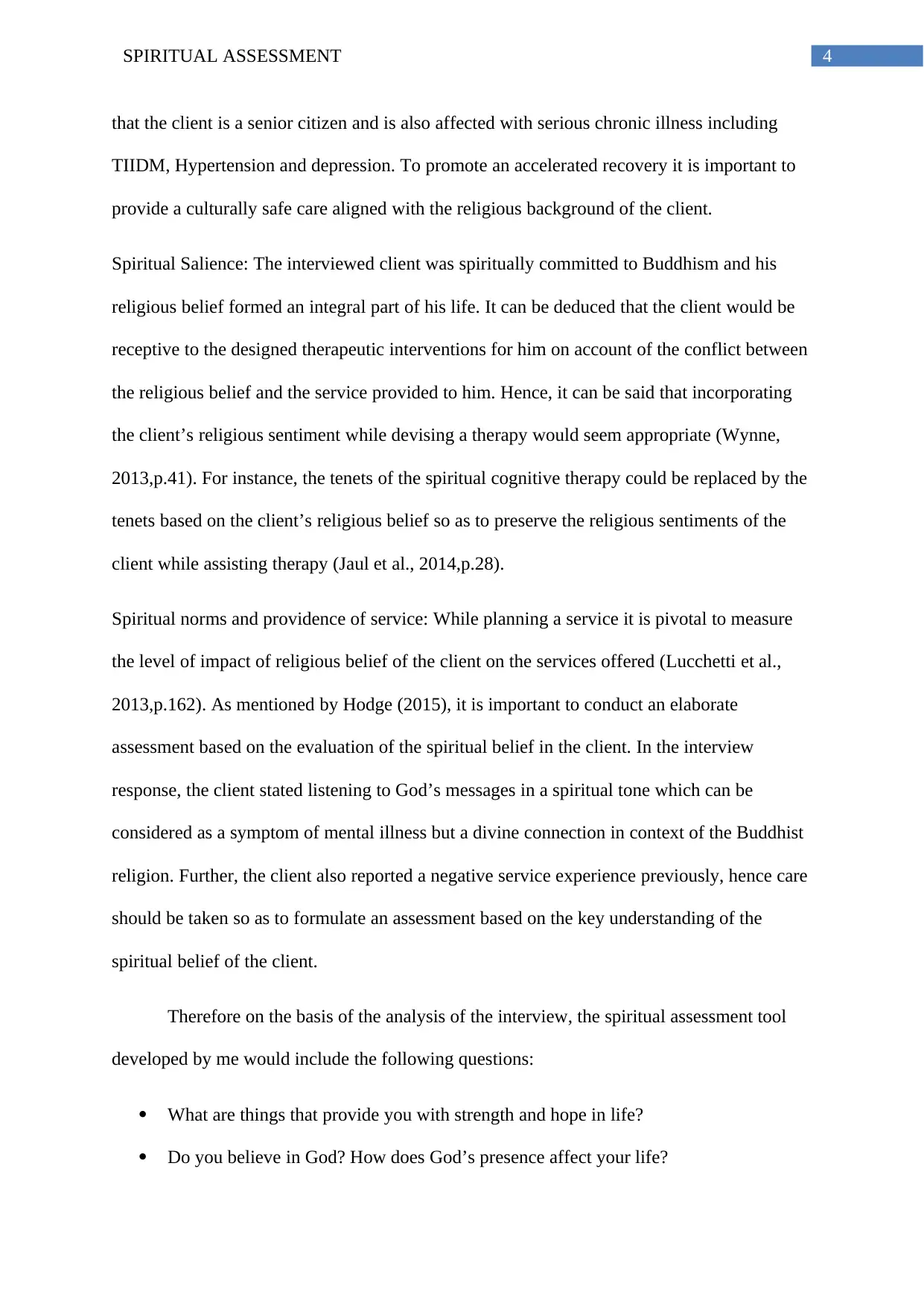
4SPIRITUAL ASSESSMENT
that the client is a senior citizen and is also affected with serious chronic illness including
TIIDM, Hypertension and depression. To promote an accelerated recovery it is important to
provide a culturally safe care aligned with the religious background of the client.
Spiritual Salience: The interviewed client was spiritually committed to Buddhism and his
religious belief formed an integral part of his life. It can be deduced that the client would be
receptive to the designed therapeutic interventions for him on account of the conflict between
the religious belief and the service provided to him. Hence, it can be said that incorporating
the client’s religious sentiment while devising a therapy would seem appropriate (Wynne,
2013,p.41). For instance, the tenets of the spiritual cognitive therapy could be replaced by the
tenets based on the client’s religious belief so as to preserve the religious sentiments of the
client while assisting therapy (Jaul et al., 2014,p.28).
Spiritual norms and providence of service: While planning a service it is pivotal to measure
the level of impact of religious belief of the client on the services offered (Lucchetti et al.,
2013,p.162). As mentioned by Hodge (2015), it is important to conduct an elaborate
assessment based on the evaluation of the spiritual belief in the client. In the interview
response, the client stated listening to God’s messages in a spiritual tone which can be
considered as a symptom of mental illness but a divine connection in context of the Buddhist
religion. Further, the client also reported a negative service experience previously, hence care
should be taken so as to formulate an assessment based on the key understanding of the
spiritual belief of the client.
Therefore on the basis of the analysis of the interview, the spiritual assessment tool
developed by me would include the following questions:
What are things that provide you with strength and hope in life?
Do you believe in God? How does God’s presence affect your life?
that the client is a senior citizen and is also affected with serious chronic illness including
TIIDM, Hypertension and depression. To promote an accelerated recovery it is important to
provide a culturally safe care aligned with the religious background of the client.
Spiritual Salience: The interviewed client was spiritually committed to Buddhism and his
religious belief formed an integral part of his life. It can be deduced that the client would be
receptive to the designed therapeutic interventions for him on account of the conflict between
the religious belief and the service provided to him. Hence, it can be said that incorporating
the client’s religious sentiment while devising a therapy would seem appropriate (Wynne,
2013,p.41). For instance, the tenets of the spiritual cognitive therapy could be replaced by the
tenets based on the client’s religious belief so as to preserve the religious sentiments of the
client while assisting therapy (Jaul et al., 2014,p.28).
Spiritual norms and providence of service: While planning a service it is pivotal to measure
the level of impact of religious belief of the client on the services offered (Lucchetti et al.,
2013,p.162). As mentioned by Hodge (2015), it is important to conduct an elaborate
assessment based on the evaluation of the spiritual belief in the client. In the interview
response, the client stated listening to God’s messages in a spiritual tone which can be
considered as a symptom of mental illness but a divine connection in context of the Buddhist
religion. Further, the client also reported a negative service experience previously, hence care
should be taken so as to formulate an assessment based on the key understanding of the
spiritual belief of the client.
Therefore on the basis of the analysis of the interview, the spiritual assessment tool
developed by me would include the following questions:
What are things that provide you with strength and hope in life?
Do you believe in God? How does God’s presence affect your life?
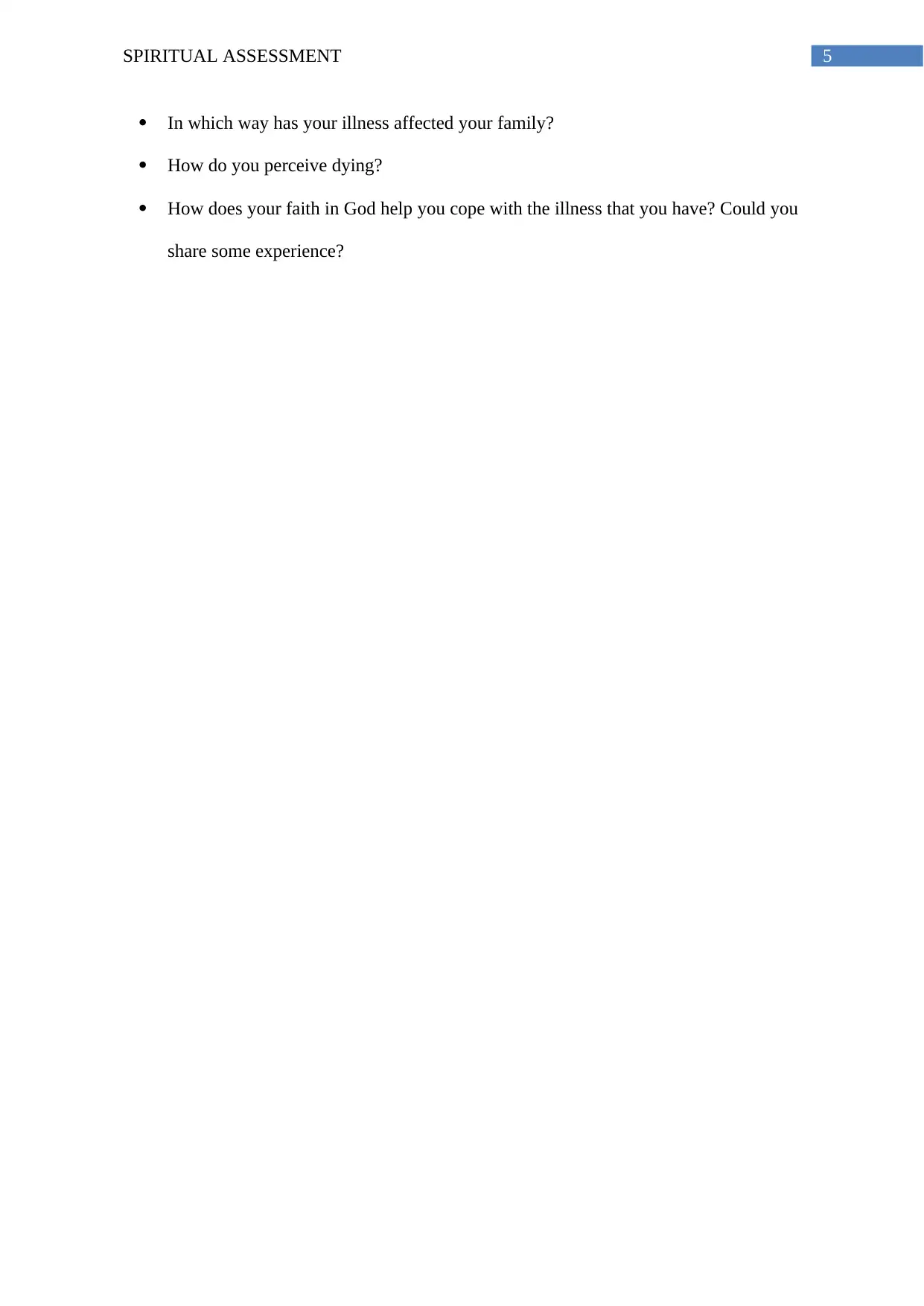
5SPIRITUAL ASSESSMENT
In which way has your illness affected your family?
How do you perceive dying?
How does your faith in God help you cope with the illness that you have? Could you
share some experience?
In which way has your illness affected your family?
How do you perceive dying?
How does your faith in God help you cope with the illness that you have? Could you
share some experience?
⊘ This is a preview!⊘
Do you want full access?
Subscribe today to unlock all pages.

Trusted by 1+ million students worldwide
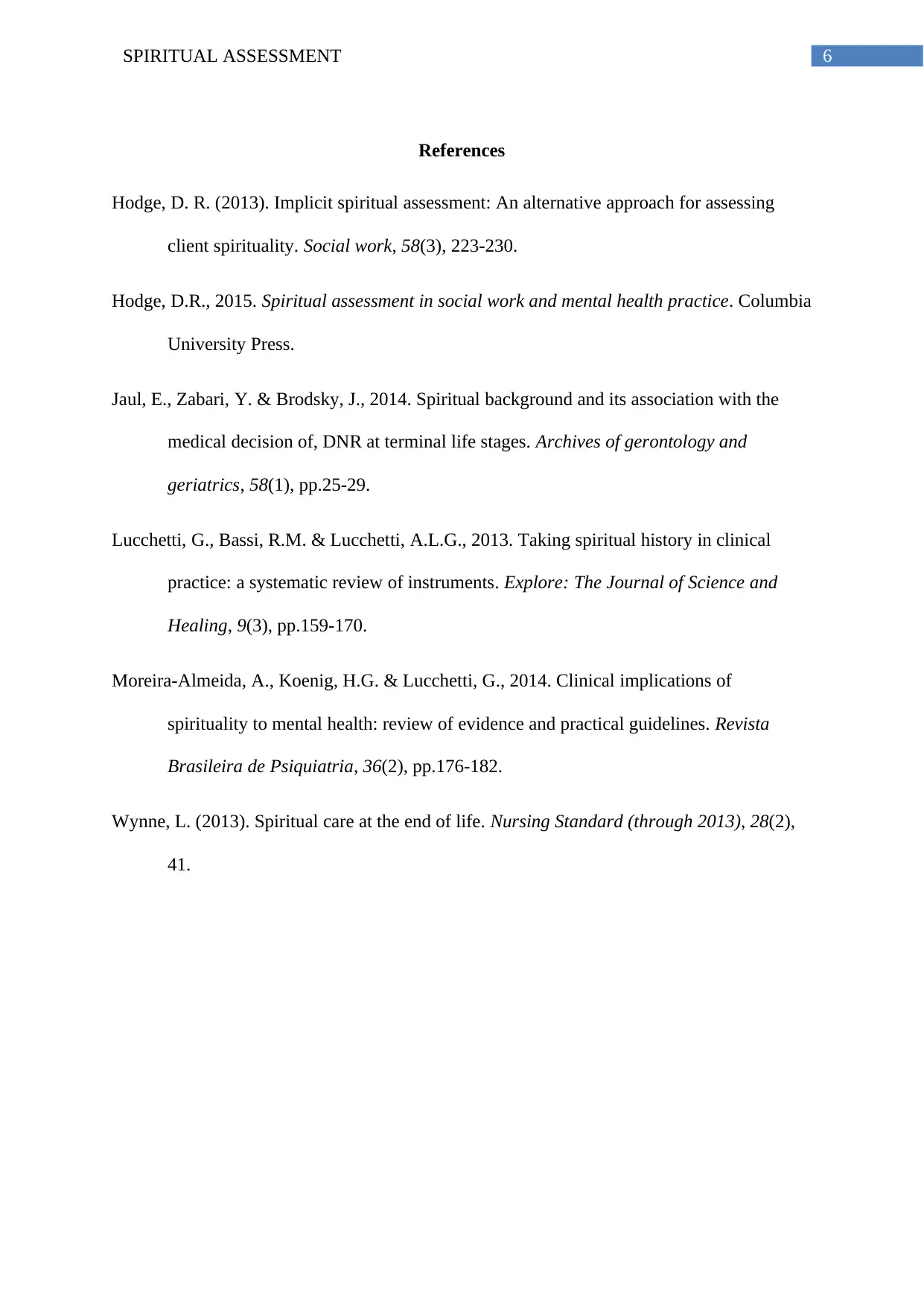
6SPIRITUAL ASSESSMENT
References
Hodge, D. R. (2013). Implicit spiritual assessment: An alternative approach for assessing
client spirituality. Social work, 58(3), 223-230.
Hodge, D.R., 2015. Spiritual assessment in social work and mental health practice. Columbia
University Press.
Jaul, E., Zabari, Y. & Brodsky, J., 2014. Spiritual background and its association with the
medical decision of, DNR at terminal life stages. Archives of gerontology and
geriatrics, 58(1), pp.25-29.
Lucchetti, G., Bassi, R.M. & Lucchetti, A.L.G., 2013. Taking spiritual history in clinical
practice: a systematic review of instruments. Explore: The Journal of Science and
Healing, 9(3), pp.159-170.
Moreira-Almeida, A., Koenig, H.G. & Lucchetti, G., 2014. Clinical implications of
spirituality to mental health: review of evidence and practical guidelines. Revista
Brasileira de Psiquiatria, 36(2), pp.176-182.
Wynne, L. (2013). Spiritual care at the end of life. Nursing Standard (through 2013), 28(2),
41.
References
Hodge, D. R. (2013). Implicit spiritual assessment: An alternative approach for assessing
client spirituality. Social work, 58(3), 223-230.
Hodge, D.R., 2015. Spiritual assessment in social work and mental health practice. Columbia
University Press.
Jaul, E., Zabari, Y. & Brodsky, J., 2014. Spiritual background and its association with the
medical decision of, DNR at terminal life stages. Archives of gerontology and
geriatrics, 58(1), pp.25-29.
Lucchetti, G., Bassi, R.M. & Lucchetti, A.L.G., 2013. Taking spiritual history in clinical
practice: a systematic review of instruments. Explore: The Journal of Science and
Healing, 9(3), pp.159-170.
Moreira-Almeida, A., Koenig, H.G. & Lucchetti, G., 2014. Clinical implications of
spirituality to mental health: review of evidence and practical guidelines. Revista
Brasileira de Psiquiatria, 36(2), pp.176-182.
Wynne, L. (2013). Spiritual care at the end of life. Nursing Standard (through 2013), 28(2),
41.
1 out of 7
Related Documents
Your All-in-One AI-Powered Toolkit for Academic Success.
+13062052269
info@desklib.com
Available 24*7 on WhatsApp / Email
![[object Object]](/_next/static/media/star-bottom.7253800d.svg)
Unlock your academic potential
Copyright © 2020–2026 A2Z Services. All Rights Reserved. Developed and managed by ZUCOL.
